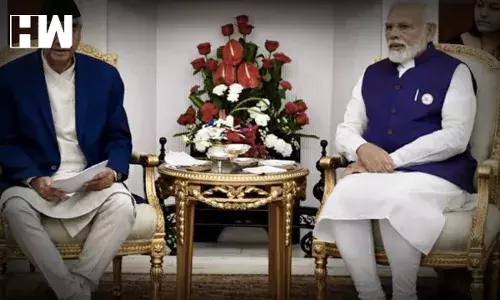Kathmandu: Sher Bahadur Deuba, Nepal’s prime minister, came home on Sunday after ending his first visit to India, during which he discussed border concerns with Prime Minister Narendra Modi, and the two leaders resolved to resolve the matter through existing mechanisms, conversation, and diplomacy.
The two prime leaders conducted extended meetings in New Delhi on Saturday, discussing a variety of crucial aspects of the two countries’ close ties.
Deuba arrived in New Delhi on Friday, accompanied by a high-level team, on a three-day visit at PM Modi’s invitation.
“The bilateral talks and exchange of views were fruitful towards further strengthening cooperative relations between the two countries,” Foreign Minister Narayan Khadka, who was also part of the entourage, said while talking to reporters in Kathmandu on Sunday.
PM Modi said that India is always concerned about Nepal’s development and assured New Delhi’s continued assistance to Kathmandu in its prioritised sectors, Narayan Khadka added.
Mr Khadka’s statement is significant in light of Prime Minister Deuba’s public call for PM Modi to establish a bilateral mechanism to address the boundary dispute on Saturday.
Foreign Secretary Harsh Vardhan Shringla remarked at a press conference hours later that there was a general awareness that the matter needed to be addressed responsibly through conversation and that “politicisation” should be avoided.
“During the talks, the two prime ministers also discussed boundary issues and the two leaders agreed to address such issues through existing mechanism and through holding dialogue and diplomacy,” he said.
Mr. Shringla’s remarks about the need to avoid politicising the border dispute are noteworthy because, in 2020, Nepalese Prime Minister K P Sharma Oli attempted to utilise the issue to deflect mounting domestic pressure and challenge to his authority.
Under then-Nepalese Prime Minister Oli’s government, bilateral ties between New Delhi and Kathmandu had deteriorated, with a new map designating Lipulekh, Kalapani, and Limpiyadhura as Nepali territories.
After Nepal released the map, India reacted sharply, calling it a “unilateral act” and cautioning Kathmandu that such “artificial enlargement” of territorial claims will not be acceptable to it.
Matters such as cooperation in education, health, energy, trade and cross border transmission lines, enhancing cross border connectivity through railway line construction, construction of integrated check post and dry port, promoting bilateral trade mainly featured during the talks between the two leaders, Mr Khadka said.
“Prime Minister Deuba also met with External Affairs Minister S Jaishankar and National Security Advisor Ajit Doval during which they discussed a variety of issues regarding promoting mutual interests and moving forward bilateral relations,” Mr Khadka said.
PM Deuba also urged Indian business leaders to invest in Nepal for bringing about economic prosperity and assured that Nepal government is effortful in bringing legal and policy level reforms for attracting foreign investment in the country.
“The visit also provided a platform to interact and exchange ideas between Nepalese and Indian business fraternity,” the minister said.
“It is our firm belief that the high-level talks Prime Minister Deuba had with Prime Minister Modi and other leaders and high officials in Delhi helped in further strengthening bilateral cooperation, collaboration and understanding between the two countries,” Mr Khadka said.
PM Deuba also extended his invitation to PM Modi to visit Nepal and in response the Indian leader recalled his past visits to Nepal and assured to visit again at appropriate time.
It was PM Deuba’s first bilateral visit abroad after becoming prime minister in July last year for a fifth time following a spell of political turmoil in Kathmandu.
PM Deuba had visited India in each of his four earlier stints as prime minister of Nepal. His last visit to India in his capacity as the prime minister was in 2017.
As an independent media platform, we do not take advertisements from governments and corporate houses. It is you, our readers, who have supported us on our journey to do honest and unbiased journalism. Please contribute, so that we can continue to do the same in future.

